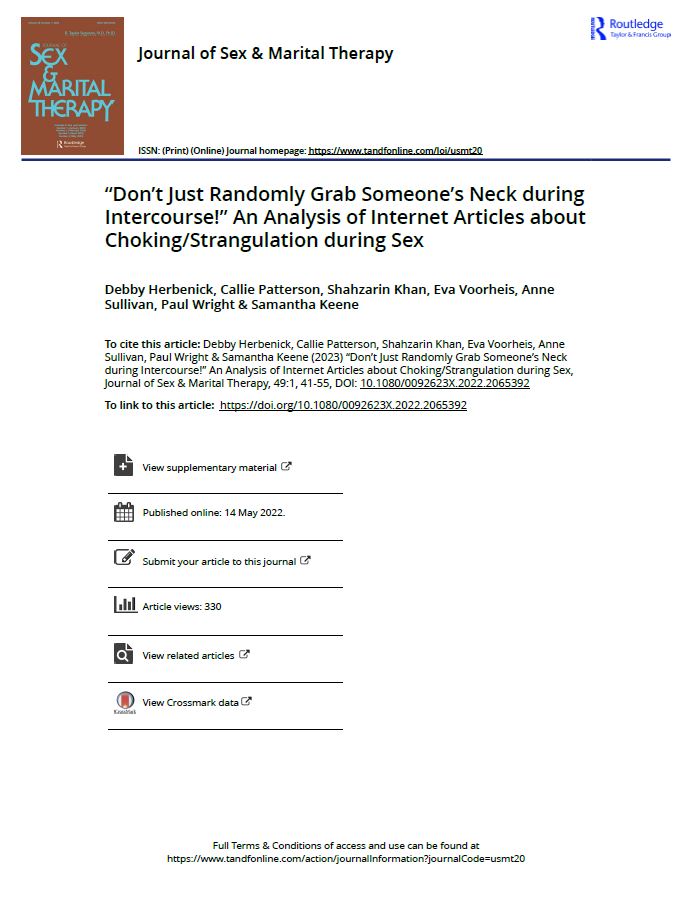Violence
Don’t Just Randomly Grab Someone’s Neck during Intercourse!
 Full Article Title: “Don’t Just Randomly Grab Someone’s Neck during Intercourse!” An Analysis of Internet Articles about Choking/Strangulation during Sex
Full Article Title: “Don’t Just Randomly Grab Someone’s Neck during Intercourse!” An Analysis of Internet Articles about Choking/Strangulation during Sex
Open Access: No
Abstract
Sexual choking/strangulation has become prevalent among young U.S. adults, yet little is known about media articles that teach readers about choking. We conducted a content analysis of 27 Internet articles, examining how choking is described, information related to health risks and healthcare, and article accuracy. Most articles described choking in positive terms and indicated choking can be done safely or properly, even while acknowledging potential dangers. Only two articles indicated having undergone expert/medical review. Few gave information about signs that would warrant seeking healthcare. Sexuality professionals need to be aware of choking-related information and misinformation in online media articles.
Relevance
“The present study extends the literature on sexual choking/strangulation by examining media articles as sources of information about this sexual practice. Most articles included at least some inaccurate information about choking and only two had undergone medical or expert review. This is unfortunate as there is a substantial literature related to the negative health outcomes of strangulation in other contexts…For example, greater frequency, intensity, and duration of strangulation has been associated with increased health risks” and “people who had been choked/strangled during sex were significantly more likely to report poorer mental health status.” None of the articles, moreover, “indicated that sexual choking is itself a form of strangulation…calling strangulation “choking” may minimize its impact on human health and relationships.” “Even when articles did provide mostly accurate information, they were often incomplete, omitting information about health risks associated with choking or when to seek healthcare.” “We were struck by the lack of specific suggestions related to consent.” Moreover, “some articles mentioned that people could die from being choked but proceeded to tell readers how to engage in choking ‘safely,’ ‘properly,’ or ‘responsibly.’ In this sense, they did not seem to grapple with the gravity of potentially killing one’s sexual partner, even though deaths via sexual strangulation (and especially deaths of women) are well documented…there was a sense that women’s lives and well-being were not valued. This was particularly apparent in a few articles that described women in misogynistic tones and seemed to taunt men about their masculinity and ability to dominate women.” “Often, it seemed that “safe” simply meant the person being choked would be unlikely to die. Yet, “not dying” seems like a shockingly low bar for sexual exploration. As women are disproportionately the ones choked, and thus at greater risk for being killed during sex (even if unintentionally), this further amplifies the idea that women’s lives are of less value than men and speaks to a long legacy of misogynistic belief systems…Overall, the articles conveyed a sense that choking/strangulation, and rough sex more generally, are normative standards that people (especially women) want, perhaps even secretly, and even if they don’t indicate wanting to be choked.”
Citation
Herbenick, D., Patterson, C., Khan, S., Voorheis, Sullivan, A., Wright, P., & Keene, S. (2022). “Don’t Just Randomly Grab Someone’s Neck during Intercourse!” An Analysis of Internet Articles about Choking/Strangulation during Sex. Journal of Sex & Marital Therapy, 49(1), 41-55. https://doi.org/10.1080/0092623X.2022.2065392
